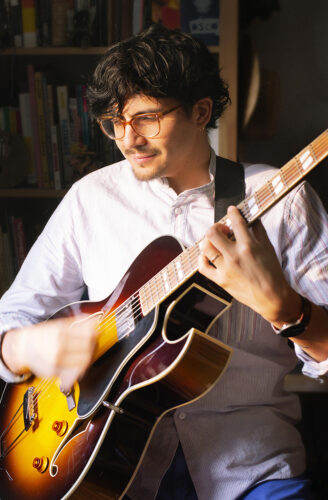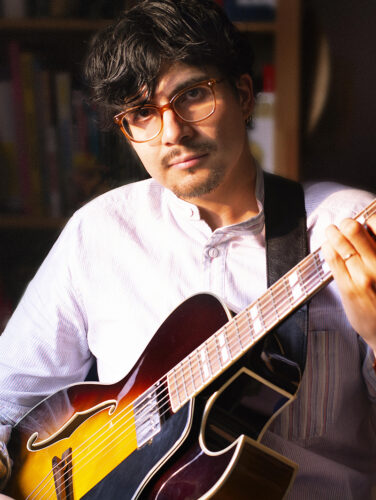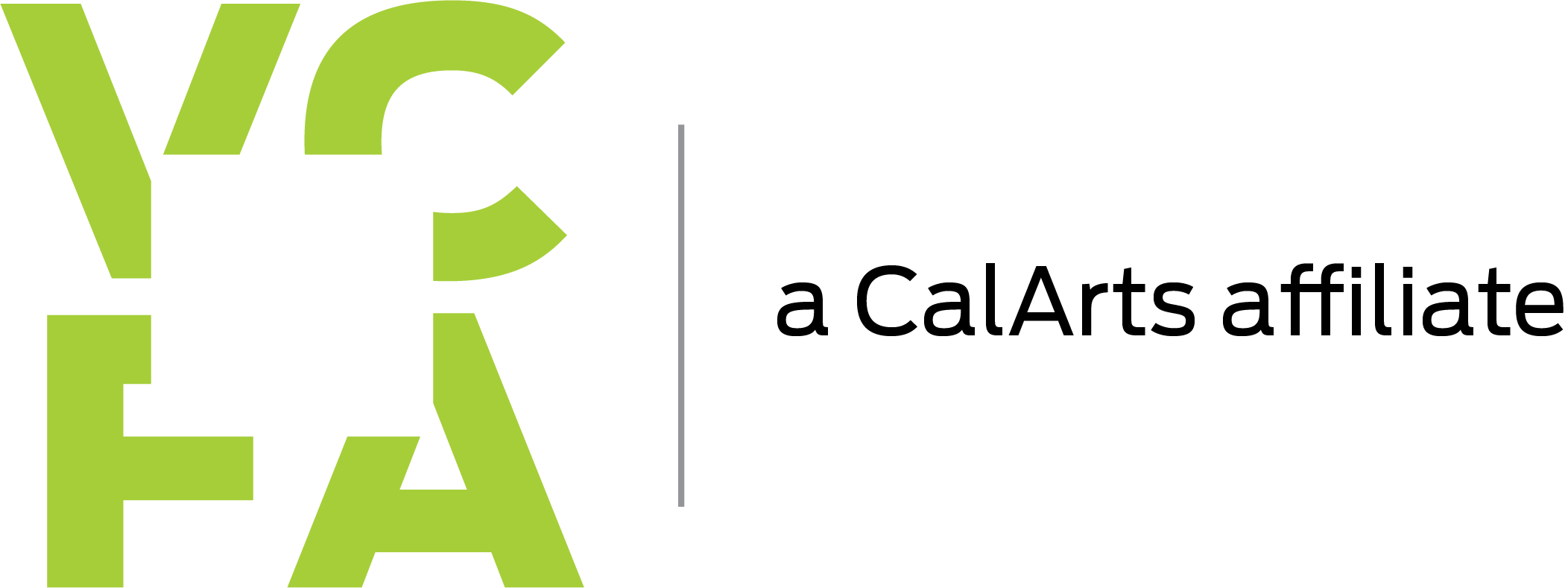Oscar Suh-Rodriguez, 2022 MFA in Music Composition
Oscar participated in an e-interview with us in November of 2020. Below are edited excerpts from our conversations about music, moving between genres, and studying at VCFA.
ON FINDING HIS WAY TO MUSIC
 My first involvement with music was around age 13. I started playing electric guitar because I wanted to form a band. I practiced on my own for a while, then started taking lessons, and then threw together a small band. Throughout high school, I spent tons of time writing and recording music into an early version of Garageband. Most of it was eccentric, Tom Waits-inspired stuff and written on the spot/in the session but it wasn’t very good. My parents were extremely supportive and really helped me build up a collection of instruments and gear—shakers, bongos, wooden flutes, accordions, ukuleles, and charango—that I still use in my production work today. I wasn’t great on any of the instruments but knew enough to write and play through a simple part. Reflecting on this time, this is probably where I learned how much fun and fulfilling music production could be.
My first involvement with music was around age 13. I started playing electric guitar because I wanted to form a band. I practiced on my own for a while, then started taking lessons, and then threw together a small band. Throughout high school, I spent tons of time writing and recording music into an early version of Garageband. Most of it was eccentric, Tom Waits-inspired stuff and written on the spot/in the session but it wasn’t very good. My parents were extremely supportive and really helped me build up a collection of instruments and gear—shakers, bongos, wooden flutes, accordions, ukuleles, and charango—that I still use in my production work today. I wasn’t great on any of the instruments but knew enough to write and play through a simple part. Reflecting on this time, this is probably where I learned how much fun and fulfilling music production could be.
ON HIS ARTISTIC STYLE TODAY AND HIS LOVE FOR THE GUITAR
While I perform in several genres, my own art is predominantly somewhere in the realm of art-pop, indie, experimental. I often call it Kate Bush meets The War on Drugs. While I’ll usually start writing a song on the guitar, I typically don’t orchestrate in a way that features the guitar. I like to use the electric guitar as a “special occasion” instrument in my music. Vocals are central to my music so I’m always looking for an interesting singer to work with. Collaborating on a song with a band is one of my favorite ways to write. It’s just straight up fun to do in a great experience to share.
I love the guitar because it’s so versatile and gives me an excuse to sneak way into all kinds of musical settings. Depending on the type of music, guitar can behave like a choir of six, like a boxer, or like a tidal wave. I honestly love the electric bass even more. It’s sound is just so huge and powerful—it makes me feel like I’m really playing. Guitarists know that they can get away with “sort of” knowing a tune but not bassists. They live on the downbeat and if they’re not on it, everything comes crashing down.
ON COMING TO VCFA AND THE BENEFITS SO FAR
 I was initially attracted to VCFA because the school didn’t split its program up into jazz, classical, and songwriting like nearly every other composition program does. The faculty, however, are what ultimately sealed the deal for me. Going through each professor’s work, I felt like they had just the right amount of “venom.” I’m not totally sure of how to explain that sentiment. Something along the lines of carrying a little bit of darkness or duende. They all have it and I dig it.
I was initially attracted to VCFA because the school didn’t split its program up into jazz, classical, and songwriting like nearly every other composition program does. The faculty, however, are what ultimately sealed the deal for me. Going through each professor’s work, I felt like they had just the right amount of “venom.” I’m not totally sure of how to explain that sentiment. Something along the lines of carrying a little bit of darkness or duende. They all have it and I dig it.
My time at VCFA, through residency and working with Ravi Krishnaswami and Jon[athan Bailey] Holland, has greatly improved the quality of my work and increased my output. I’ve seen the fidelity of my recorded work improve remarkably. I’ve integrated all sorts of new analog and digital tools and processes into my work.
ON RESIDENCY AND REMOTE RESIDENCY
As a composer, VCFA residencies have given me a great excuse to indulge. The program is strongly noncompetitive, which is such a welcome contrast to the competitive vibes conservatories tend to have. It was immediately recognizable. As a low-key introvert, my own perspective even tends to shift during residency. I feel more outgoing, more willing to talk to others, etc. It feels like everyone in the program is effectively “weird” (that’s meant as a compliment) and just fits right together.
I adored the remote [2020] residency. It was great to have my instruments on hand all throughout the program and work comfortably from my home studio. I’m someone who feels a little uncomfortable sitting in a classroom and raising my hand or having to project my voice to ask a question. Working online, it feels like I have all the right tools on hand to help me make my way into the discourse. Sometimes, it’s as simple as turning my mic up and typing into a chat.
ON HIS RECENT SUCCESSES AND UPCOMING WORK
I launched my own indie label Kidokoro Records in April 2020 as a way to get involved with artists that I love. I’ve worked with my own project June Pageant, singer-songwriter Edward Phillips, and have a few more I’m producing that I may bring into the fold.
Kidokoro Records will soon drop June Pageant’s Beneath the Feather Star EP ⅔, which features collaborations with John Paul Labno and another drumming by Keith Butler, Jr.—both VCFA students from my graduating class. Find more info on our site, kidokororecords.com.
Interested in an MFA in Music Composition? Visit our program page for more information on our VCFA graduate degrees.

